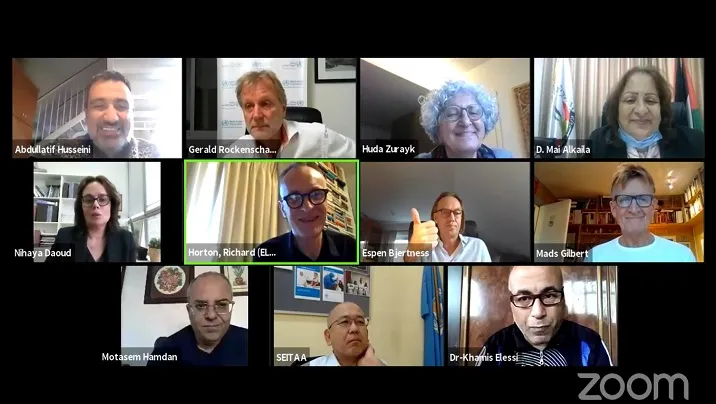The COVID-19 Pandemic: from the global, local and regional perspectives
On 4 November 2020, the Lancet Health Alliance (LPHA) held a special virtual workshop on COVID-19 from remote. Entitled “The COVID-19 Pandemic: From the Global, Local and Regional Perspectives”, the workshop was organized and hosted by the Institute of Community and Public Health (ICPH), Birzeit University (BZU), where the secretariat of the LPHA is located.
Dr. Richard Horton, Editor in Chief of the prestigious scientific medical and public health journal The Lancet, opened and moderated the workshop. Dr. Horton welcomed the audience and introduced the workshop’s speakers: Dr. Mai Alkaileh, the Palestinian Minister of Health, Professor Abdullatif Husseini, the Director of ICPH, BZU, Professor Nihaya Daoud, the Founder and Director of the Public Health Associations for the Arab Society, and Dr. Gerald Rokenschaub, Head of the WHO’s office in the occupied Palestinian territory (oPt).
Dr. Horton spoke about the COVID-19 pandemic from a global perspective. In his presentation, Dr. Horton focused on five main questions 1) What is the current situation? 2) What are the lessons so far? 3) What could have been done better? 3) What’s the end game? 5) What must governments do now? Dr. Horton expressed his optimism as societies are going to change after the pandemic and all-new societal beginnings have new opportunities that need to be grasped. He also explained that those who were at the margins of societies will be centered. Public health will become a more important value in societies and there will be more investment in future social protection. The pandemic should be managed as a syndemic, which combines both the social and the biomedical aspects. He was also optimistic because of the amount of cooperation and solidarity and unity from the medical and scientific community.
Dr. Alkaileh introduced the Palestinian Ministry of Health’s (MoH) system components including the healthcare delivery system. She also compared the COVID-19 situation in the oPt with Jordan, Israel, and the region and spoke about the MoH’s preparedness for the pandemic and its epidemiological crisis management program. Dr. Alkaileh concluded by highlighting the main challenges the Ministry is facing during the pandemic: Israeli military occupation, the financial crisis, shortage of health workers, overstretched hospital capacity and community beliefs, and resistance to the reality of the pandemic.
Professor Abdullatif Husseini’s presentation on the epidemiology of COVID-19 included a review of the general epidemiological picture in the oPt and provided a summary of the COVID-19 situation among Palestinians in the oPt and the diaspora; time trends, the age distribution of those affected, and transmission methods. He emphasized the importance of obtaining much-needed data on COVID-19 and how the Ministry’s Information System could cooperate with researchers to make such data available. Professor
Professor Nihaya Daoud spoke about the intensified inequalities in health during the COVID-19 pandemic, highlighting the case of Palestinians inside the Green Line. Professor Daoud’s presentation focused on the prevalence and spread of COVID-19, inequalities between Palestinians and Jews, health policies towards Palestinians inside the Green Line, and institutional discrimination. She emphasized how the COVID-19 outbreak added another level of health inequality to the existing health inequalities which resulted in intensifying the inequalities Palestinians inside the Green Line face.
Dr. Gerald Rokenschaub spoke about the COVID-19 pandemic in the Eastern Mediterranean countries, and their varied epidemiological trends, the challenges of the pandemic in the oPt such as the fragmentation of the Palestinian health system, the capacity gaps with depleted drugs and medical supplies, the severe barriers which come in the way of access to health care especially among referral patients, the worsening of the social determinants of health and exposure to violence and excessive use of force. He also spoke about the current situation and trends and provided a brief overview of what UN partners have mobilized to support their response to the pandemic in the country. A question and answers session followed.
The workshop was conducted from remote and was live-streamed on the ICPH official Facebook page and YouTube channel. Thirty-two participants joined the meeting including the speakers, the LPHA Coordination Committee, the LPHA Steering Group, and the LPHA reviewers. Two hundred and thirteen persons attended the YouTube live streaming and 33 persons attended the livestreaming on Facebook. To access the workshop videos please use our YouTube and Facebook links.
